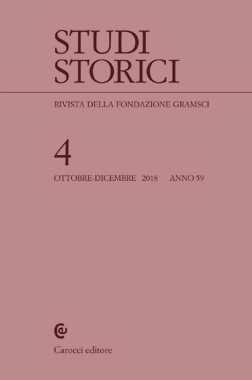
luglio - settembre 2016 anno 57
Sommario e abstract degli articoli
Leonardo Rapone, pp. 481-521
Fascismo e «governo mondiale»: un libro dimenticato, un percorso intellettuale dalla sinistra fascista all’integrazione europea
Fascism and «world government»: A forgotten book, and an intellectual path from the fascist left to European integration
This paper focuses on an old and forgotten book which, even at the time of its publication (1948), garnered no special attention. The book, Questa Italia, written by Roberto Ducci, who was to become one of the most important Italian diplomats of the first thirty years of the Republic, offered an initial, brief reconstruction of the historical parabola of fascism. Ducci proposed an original interpretation of the historical role that fascism had played in the first half of the twentieth century. He featured one of the earliest portrayals of Italian fascism as a «mass regime», and believed that fascism had been a manifestation of the historical transition from liberal to new forms of «state economy»: a still ongoing transition in the post-war decades, of which the Beveridge Report and the 1945 Labour government constituted the most significant variations on the democratic side. Thanks to the analysis and interpretation of the previous thirty years, Ducci drew conclusions about the future: the decay of the Nation State and the need to respond to its crisis by promoting the integration of spaces and the creation of new centres of supranational authority, in the perspective of a «world government» or at least of the United States of Europe. Through an analytical approach, the paper reconstructs the contents of the book, by relating it to the author’s own intellectual itinerary, in which he had served as a young man in the fascism’s left wing and eventually became a fervent supporter of European integration.
Antonello Mattone, pp. 523-575
Il ministro Antonio Segni «agrarista». Politica e scienza giuridica nell’elaborazione della riforma fondiaria e della legge sui contratti agrari (1946-1950)
From civic uses to the commons: Studies on collective ownership in Italian medieval and modernist studies, and major international historiographical trends
Like the accountant Alfredo Rocco who, as Minister of Justice, transformed himself, in conceiving and drafting the 1930 Code, into an expert in the criminal law, in the same way the trial and civil lawyer Antonio Segni, during his experience as Minister of Agriculture, became, out of necessity, an experienced and skilled expert in agrarian policy. The study, conducted mainly on documents from Archivio Antonio Segni conserved at the University of Sassari, analyses the Minister’s legal contribution in the Sila law and then land reform, known as the «transitional law». The second part of the work focuses on the development of the law on agricultural contracts, but Segni met strong opposition from landowners and the moderate sectors of the Christian Democrats. A portrait emerges of Segni the reformer, and of his conception of small peasant ownership as a driver of the countryside’s socioeconomic development.
Davide Cristoferi, pp. 577-604
Da usi civici a beni comuni: gli studi sulla proprietà collettiva nella medievistica e modernistica italiana e le principali tendenze storiografiche internazionali
From civic uses to the commons: Studies on collective ownership in Italian medieval and modernist studies, and major international historiographical trends
This paper aims to gather and summarize the studies on collective properties and the commons developed by historians of the Middle Ages and Early Modern times in Italy during the last two centuries. The paper also intends to focus on the influence of European and American literature on Italian historiography regarding the commons, with particular regard to the approaches of socioeconomic and environmental history. First, the paper focuses on the contributions and approaches of scholars of jurisprudence and of Medieval and Modern law. It also analyses the political and cultural context that provided the background for their research (§ 1). Secondly, it summarizes the main approaches of American social scientists on common pool resources – Garret Hardin’s Tragedy of the Commons and Elinor Ostrom’s Governing the Commons – as well as the chief environmental and eco-history contributions (§ 2). The paper then focuses on studies by historians of the Middle Ages and Early Modern times, analysing the most developed regional literature and the main contributions and collective works (§ 3), as well as the recent season of studies on the management of the commons (§ 4).
Giuseppe Mrozek Eliszezynski, pp. 605-637
Il destino del cardinal Filomarino. Dibattito sulla rivolta, conclave e peste negli anni del viceré Castrillo (1653-1658)
The fate of cardinal Filomarino. Debate over the uprising, conclave and plague in the years of viceroy Castrillo (1653- 1658) One of the
One of the many tasks that the Count of Castrillo, who arrived in Naples in 1653, inherited from the previous Viceroy, the Count of Oñate, was that of bringing to an end the intricate issue concerning the Cardinal and Archbishop Ascanio Filomarino. This prelate, who had been already accused of infidelity to his legitimate sovereign during the so-called revolt of Masaniello, had given rise to various kinds of clashes (political, jurisdictional, religious, ceremonial) during the government of the Count of Oñate who, however, had not succeeded in having him removed from Naples. This article aims to reconstruct how this situation evolved during the government of the Count of Castrillo, when the debate over the responsibilities for the uprising and Filomarino’s actions were intertwined with the demands of the Spanish Monarchy’s international policy, and with two events of central importance: the conclave of 1655 and the plague of 1656-1658.
Francesco Tacchi, pp. 639-668
«Kann Ein Katholik Sozialdemokrat Sein?». Teoria e pratica di un’incompatibilità in Germania alla luce del caso magontino (1890-1920)
«Kann ein Katholik Sozialdemokrat sein?». Theory and practice of an incompatibility in Germany in the light of the Mainz case (1890-1920)
In the decades at the turn of the twentieth century, Socialists and Catholics in Germany stood at two opposite poles of a propaganda battle over the possibility of osmosis between their respective milieus. According to the former, a Katholik had several reasons for being a Sozialdemokrat as well; for the latter, on the contrary, Christianity and Socialism were two elements of an irreconcilable antithesis: this idea was conveyed through a series of publications that continued until the first postwar period. While the Catholic point of view seemed very clear theoretically, in practical terms things were far more complicated. What attitude should Catholic priests take towards those believers who sympathized with the socialist ideal or had embraced it, and nonetheless wanted to continue their life within the Church? This paper investigates this question through the case-study of the Diocese of Mainz, where some parish priests in the early twentieth century wondered as to the advisability of absolving, in the confessional, readers of socialist newspapers, and of granting church burials to SPD militants. It then considers the postwar situation, when the German episcopacy decided for the first time to intervene as a body in order to determine guidelines for the pastoral care of Socialist Catholics.
Francesco Caccamo, pp. 669-707
Per la riforma del socialismo reale. Zdeněk Mlynář e il «team» per lo sviluppo del sistema politico
Zdeněk Mlynář and the team for the development of the political system
Starting from the early 1960s, Czechoslovak society and the Communist Party of Czechoslovakia experienced a progressive opening that would eventually lead the way to the Prague Spring. A particular feature of this opening was the creation of various research groups or teams aimed at preparing wide-ranging reform projects. This essay focuses on the activities of the team for the development of the political system led by Zdeněk Mlynář. This team had the ambitious task of laying the foundations for an overall reform of the political model that had been established in Czechoslovakia through two decades of real socialism. From late 1966 to early 1968, Mlynář and his collaborators developed a series of studies that examined sensitive issues such as the democratization of the communist party, respect for civil rights, the establishment of an opposition, the introduction of some form of pluralism, and even the creation of new parties. In the end, the team was unable to reach final conclusions due to increasing political turmoil during 1968 and the subsequent Soviet intervention. Nonetheless, it laid the groundwork for one of the documents most typical of the Dubček era, the Action Program. And above all, the unpublished documents taken into consideration bear clear witness to the search for a national path to democratic socialism and the desire to break free of the orthodox Soviet model.
Sfoglia gli altri numeri dell’anno 57 / 2016
Elenco dei fascicoli pubblicati dal 2010
Seleziona fascicolo...
- anno 65 / 2024
- 1
- 2
- anno 64 / 2023
- 1
- 2
- 3
- 4
- anno 63 / 2022
- 1
- 2
- 3
- 4
- anno 62 / 2021
- 1
- 2
- 3
- 4
- anno 61 / 2020
- 1
- 2
- 3
- 4
- anno 60 / 2019
- 1
- 2
- 3
- 4
- anno 59 / 2018
- 1
- 2
- 3
- 4
- anno 58 / 2017
- 1
- 2
- 3
- 4
- anno 57 / 2016
- 1
- 2
- 3
- 4
- anno 56 / 2015
- 1
- 2
- 3
- 4
- anno 55 / 2014
- 1
- 2
- 3
- 4
- anno 54 / 2013
- 1
- 2
- 3
- 4
- anno 53 / 2012
- 1
- 2
- 3
- 4
- anno 52 / 2011
- 1
- 2
- 3
- 4
- anno 51 / 2010
- 1
- 2
- 3
- 4
